World Bank launches a Consultation for Tajikistan Country Partnership Framework 2019-2022

The World Bank has launched a consultation process with key stakeholders in Tajikistan on the Country Partnership Framework for 2019-2022, which will also draw upon insights from the upcoming Systemic Country Diagnostic, according to the World Bank office in Dushanbe.
In this context, the World Bank’s Regional Director for Central Asia, Lilia Burunciuc, and the newly appointed World Bank Country Manager for Tajikistan, Jan-Peter Olters, met with the President of the Republic of Tajikistan, Emomali Rahmon, to discuss medium-term development opportunities, constraints, and priorities for the country.
«A productive, profitable private sector is the backbone of any successful economy,» said Jan-Peter Olters, Country Manager for Tajikistan. “And the World Bank stands ready to support the Government of Tajikistan in its efforts to provide strong foundations for dynamic rates of sustainable and inclusive growth.»
In the coming months, Mr. Olters will lead consultations with the Government of Tajikistan, the private sector, development partners, civil society, academia, and others to identify possible interventions with which the World Bank can support the country’s ambition to transform the economy along the «industrial-innovative scenario» spelt out in Tajikistan’s National Development Strategy for the Period to 2030.
In their discussion, the World Bank delegation concurred with President Rahmon that the provision of secure, reliable and affordable energy to all citizens and resident enterprises was a precondition for any successful development strategy.
Currently, the World Bank is financing 21 projects in Tajikistan, with a net commitment of US$ 582.6 million. The projects aim to support economic growth through private sector development, while also investing in public services such as education, health, water and sanitation, and social protection. The World Bank is committed to continuing its support for Tajikistan as it strives to improve the lives and meet the aspirations of its young and growing population.











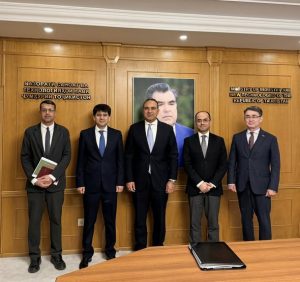 Tajikistan, Egypt Eye New Industrial Initiatives
Tajikistan, Egypt Eye New Industrial Initiatives Political Consultations Between the Republic of Tajikistan and the United Kingdom Held in London
Political Consultations Between the Republic of Tajikistan and the United Kingdom Held in London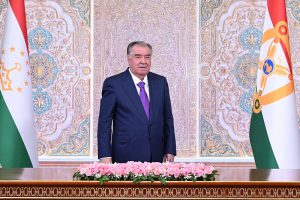 Iranian scholar praises Emomali Rahmon’s Initiative to Distribute “Shahnameh” to Every Tajik Family
Iranian scholar praises Emomali Rahmon’s Initiative to Distribute “Shahnameh” to Every Tajik Family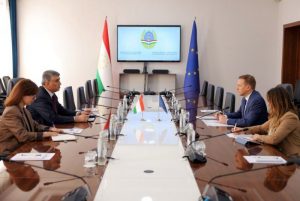 Tajikistan, European Union Discuss Improving Mutual Legal Assistance
Tajikistan, European Union Discuss Improving Mutual Legal Assistance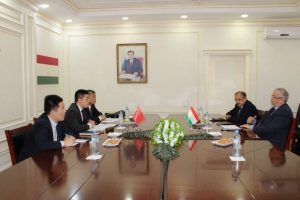 Tajikistan, China Discuss Expanding Strategic, Scientific Cooperation
Tajikistan, China Discuss Expanding Strategic, Scientific Cooperation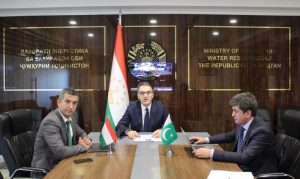 Tajikistan, Pakistan Discuss Energy Cooperation, Plan Joint Commission Meeting
Tajikistan, Pakistan Discuss Energy Cooperation, Plan Joint Commission Meeting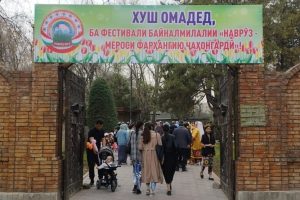 Dushanbe to Host International Navruz Festival Showcasing Tajik Culture and Tourism
Dushanbe to Host International Navruz Festival Showcasing Tajik Culture and Tourism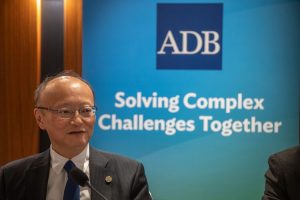 Asian Development Bank President Masato Kanda to Visit Tajikistan in March
Asian Development Bank President Masato Kanda to Visit Tajikistan in March Tajikistan, Bashkortostan Officials Discuss Expanding Interregional Cooperation
Tajikistan, Bashkortostan Officials Discuss Expanding Interregional Cooperation Tajikistan, Azerbaijan Discuss Strengthening TV and Radio Cooperation
Tajikistan, Azerbaijan Discuss Strengthening TV and Radio Cooperation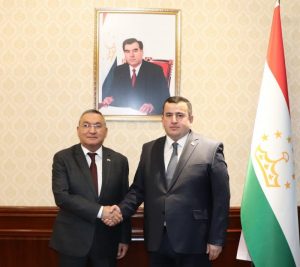 Tajikistan, Kazakhstan Discuss Expanding Economic and Trade Cooperation
Tajikistan, Kazakhstan Discuss Expanding Economic and Trade Cooperation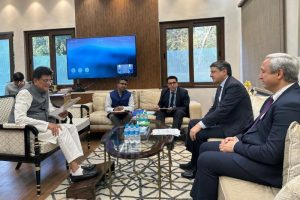 Tajikistan and India Discuss Expanding Industrial and Technology Cooperation in New Delhi
Tajikistan and India Discuss Expanding Industrial and Technology Cooperation in New Delhi














